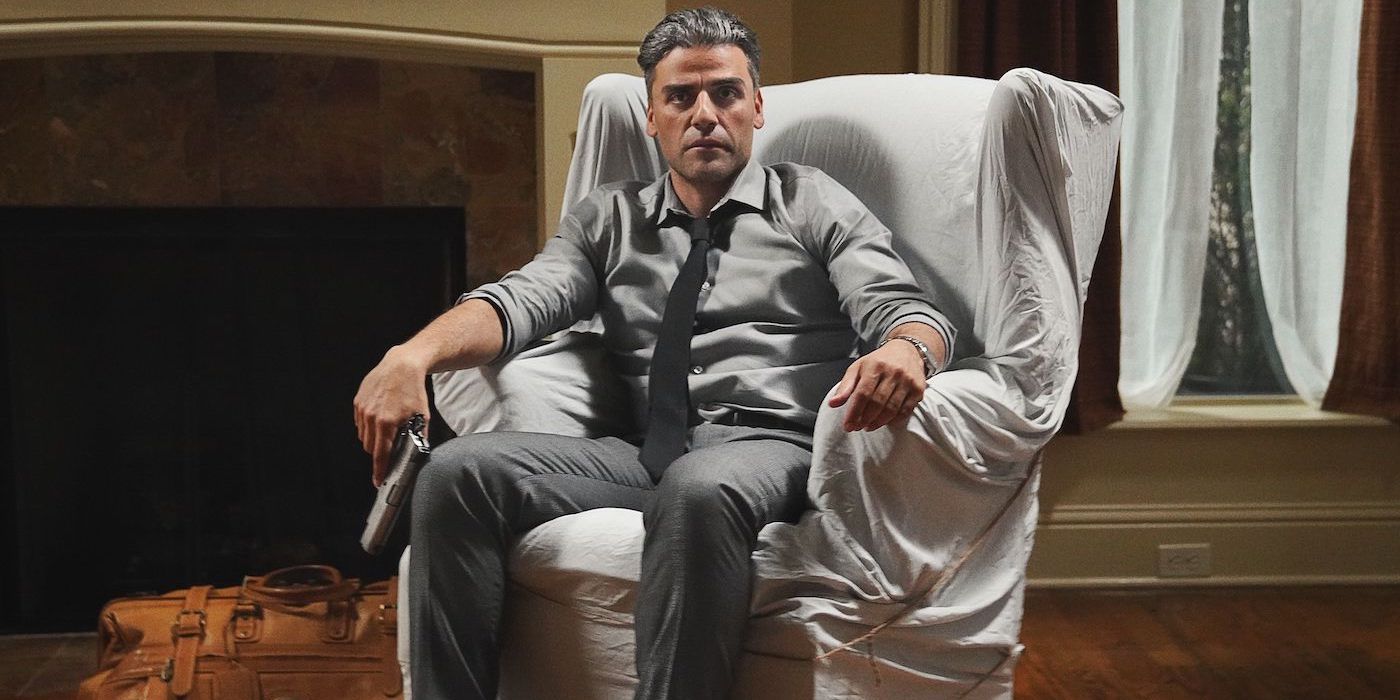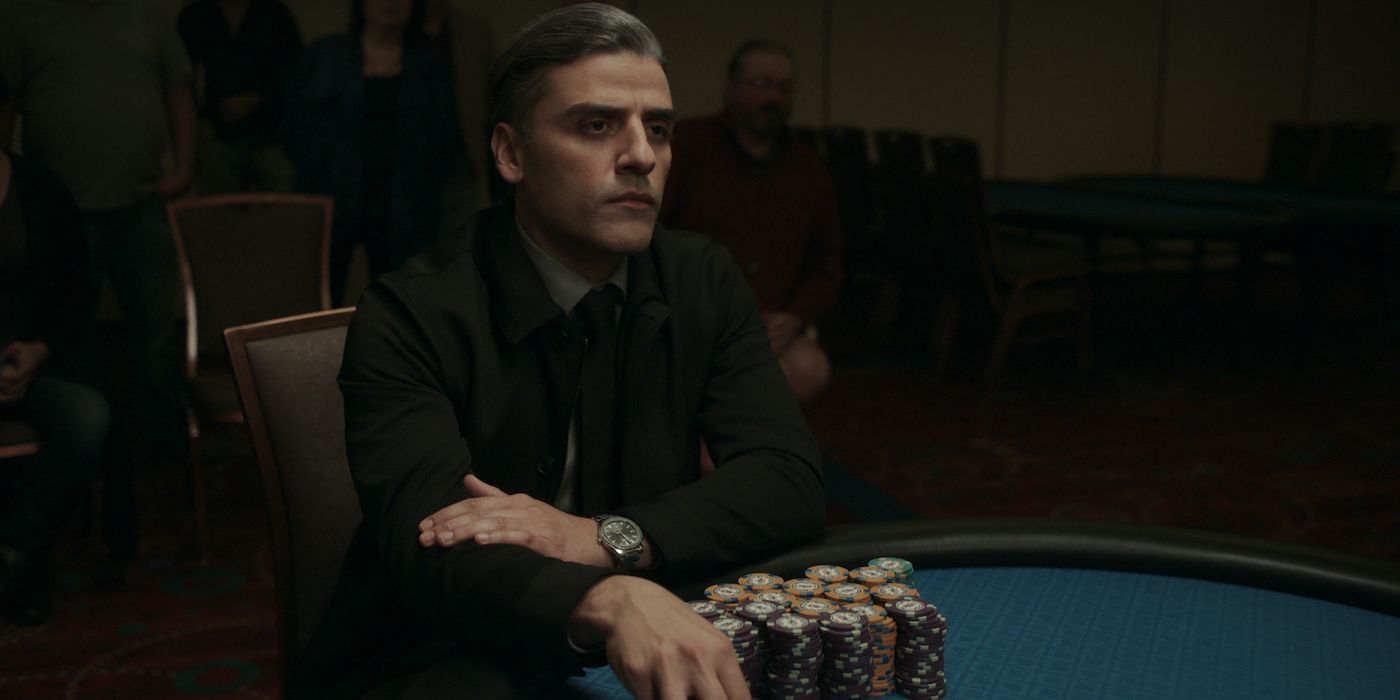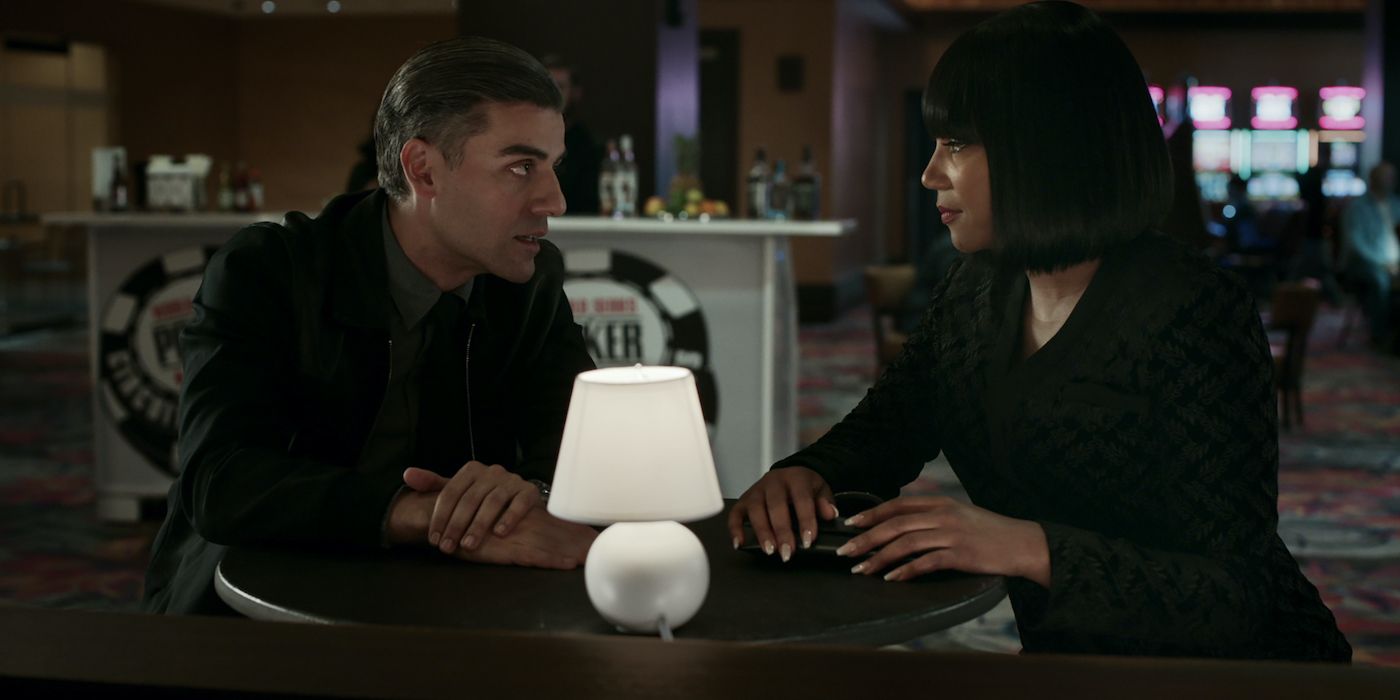Redemption is a tricky concept. It’s separate from forgiveness, and perhaps redemption—outside of any spiritual concept or religious faith—is wholly impossible. What’s done is done, and we have to live with our sins until we die. Like his previous film, First Reformed, writer-director Paul Schrader’s new work, The Card Counter, is a fascinating study in futility. Both protagonists keep diaries to sketch out their thoughts on a world they’re grasping to understand and exercise some kind of control over their meager existences, but whereas First Reformed looks at the world’s decay through the lens of religious faith, The Card Counter looks at moral decay through the eyes of imprisonment. Led by a strong central performance from Oscar Isaac, The Card Counter offers few easy answers beyond playing the hand your dealt.
William Tell (Isaac) ekes out a meager living as a professional gambler. After serving over eight years in a federal penitentiary where he taught himself how to win at blackjack and poker, William now makes enough to live a nomadic existence. He never takes the casino, and the casinos allow him to operate as long as he keeps his winnings modest. However, when William crosses paths with Cirk (Tye Sheridan), his plans change. Cirk is the son of a soldier who tortured “enemy combatants” during the war, the same crime that sent William to prison while his superior, and the superior of Cirk’s father, Major John Gordo (Willem Dafoe), got off scot-free and now makes a comfortable living as a private security contractor. Cirk has a plan to avenge his deceased father by kidnapping, torturing, and killing Gordo, but Tell sees a different way forward. With the help of La Linda (Tiffany Haddish), who runs a stable (a way for wealthy people to use professional gamblers to earn big paydays and then split the winnings), Tell believes that if he can pay off Cirk’s debts and repair his bond with his mother, then the ex-con may find redemption for his past sins.
For Tell, the world is a prison, and one he’s become quite comfortable in. The movie mostly takes place in these prisons where only the rules and the décor change, but they each ruthlessly hold Tell in their grasp. The first prison is Abu Ghraib, where he excelled at torturing prisoners. The second prison is Leavenworth, where he was sentenced for that torture. The final prison is the casinos, a kind of purgatory where Tell can’t move forward and he can’t go back. When he shows up in a new town, he goes to a cheap motel, takes out his own sheets, and wraps the furniture in the linens, making his room as spartan as possible to evoke the kind of captivity in which he feels comfortable. Like First Reformed’s Ernst Toller (Ethan Hawke), Tell is a man flagellating himself in hopes that he can somehow move beyond his past, but the past simply will not leave him alone, and the future doesn’t appear much brighter.
Into this mix, you need a top-tier actor, and Isaac once again shows why he’s the best working today. He wisely chooses to play Tell with a methodical quiet, someone who has found order in an almost monastic lifestyle where it’s not that he derives joy from gambling as much as he’s found a way to succeed at it, keep himself off the radar, and in an environment that doesn’t really encourage personal connections. A lesser actor would turn Tell into a largely blank slate, but Isaac keeps all of the character’s guilt, anger, resentment, and depression boiling beneath the surface. You can tell he’s just barely holding it together and only in his conversations with Cirk does the façade begin to slip, and even then, it’s only the briefest glimpse of the pain lurking underneath the surface.
The only escape from that pain appears to be the control of gambling—a good metaphor for the belief you can control your fate—and the gambling scenes are surprisingly captivating, especially when you realize that The Card Counter isn’t really a gambling movie. Yes, there are touches here and there, but overall, gambling is a gateway to Schrader’s critiques, like a rival gambler who goes by the moniker “MR. USA” (Alexander Babara), even though he’s Ukrainian, but never seems to lose and has a chorus of doofuses who chant “USA! USA!” after his victories. It may not exactly be the most subtle aspect of The Card Counter, but it does work on the macro-level of critiquing the U.S. while never losing sight of the personal struggle faced by Tell.
Some may find The Card Counter a little too slow, or not quite the gambling movie they expected (although the involvement of Schrader really should have been a tip-off). But for those willing to play it out, you’ll get wrapped up in the depressing futility of Tell’s quest. It’s certainly not the most uplifting movie of the year (although I’m still wrapping my mind around the film’s final shot), but it shows Schrader once again captivating his audience through tough ideas, tougher morality, and a lead actor giving one of the best performances of the year.
Rating: B+



